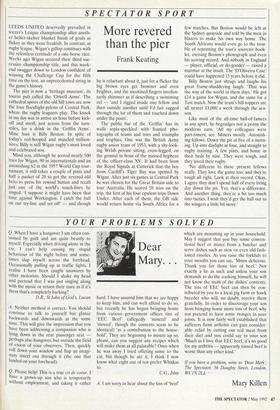SPECTATOR SPORT
More revered than the pier
Frank Keating
LEEDS UNITED deservedly prevailed in soccer's League championship after anoth- er helter-skelter blanket finish of goals as flukey as they were freakish. In contrast, at rugby league, Wigan's gallop continues with the relentless certitude of a one-horse race. Weeks ago Wigan secured their third suc- cessive championship title, and this week- end swagger down to London confident of winning the Challenge Cup for the fifth time on the trot, an unprecedented string in the game's history.
The pier is now a 'heritage museum', its tourist pub called the 'Orwell Arms'. The cathedral spires of the old hill town are now the four floodlight-pylons of Central Park, where the rugby leaguers play. The knack in my day was to arrive an hour before kick- off and stroll, just across from the turn- stiles, for a drink in the 'Griffin Arms'. Mine host is Billy Boston. In spite of today's red-hooped and muscled million- aires, Billy is still Wigan rugby's most loved and celebrated son.
Mind you, although he scored nearly 500 tries for Wigan, 90 in internationals and an astonishing 62 in the 1957 World Cup tour- nament, it still takes a couple of pints and half a packet of 20 to get the revered old hero to press his rewind button and recall just one of the world's touch-lines he singed. 'I suppose it might have been that time against Workington. I catch the ball on our try-line and set off' — and though he is reluctant about it, just for a flicker the big brown eyes get brovirner and even brighter, and the nicotined fingers involun- tarily shimmer as if describing a swimming eel — 'and I zigged inside one fellow and then outside another until I'd fair zagged through the lot of them and touched down under the posts'.
The public bar of the 'Griffin' has its walls sepia-speckled with framed pho- tographs of teams and tries and triumphs and trophies. One was the British Army rugby union team of 1953, with a shy-look- ing Welsh private sitting, cross-legged, on the ground in front of the massed hyphens of the officer-class XV. It had been from the Royal Signals at Catterick that the boy from Cardiff's Tiger Bay was spotted by Wigan. After just six games at Central Park he was chosen for the Great Britain side to tour Australia. He scored 58 tries on the trip, the first of his four opulent trips Down Under. After each of them, the GB side would return home via South Africa for a few matches. But Boston would be left at the Sydney quayside and told by the men in blazers to make his own way home. The South Africans would even go to the trou- ble of reprinting the tour's souvenir book- let, excising Boston's photograph and even his scoring record. And nobody in England — player, official, or do-gooder — raised a murmur at the insult. The `D'Oliveira Case' could have happened 15 years before it did.
Billy Boston just shrugs and laughs his great frame-shuddering laugh. 'That was the way of the world in them days.' He got £14 a game for Wigan, and the same for a Test match. Now the team's bill-toppers are all nearer £1,000 a week through the sea- son.
Like most of the all-time hall-of-famers in any sport, he begrudges not a penny the moderns earn. 'All my colleagues were part-timers, see. Miners mostly. Astonish- ing fellows. Down the pit at five of a morn- ing. Up into daylight at four, and straight to rugby training. A few pints, and home in their beds by nine. They were tough, and they loved their rugby.
'No different to these present fellows really. They love the game too, and they're tough all right. Look at their record. Okay, I agree they don't spend half of every living day down the pit. Yes, that's a difference. And another thing, they're a bit too much into tactics. I wish they'd get the ball out to the wingers a little bit more.'


















































 Previous page
Previous page